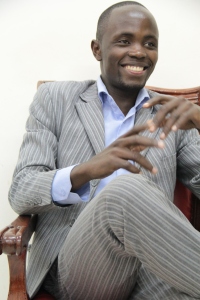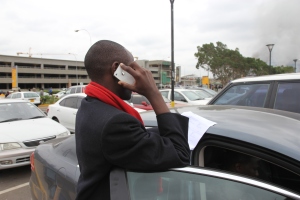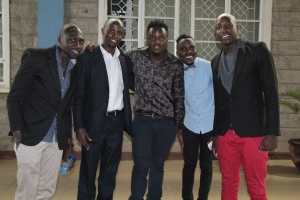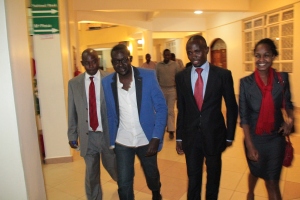Q. You are always in hurry, why do you walk so fast?

LONE FELIX ILLUSTRATES A POINT DURING THE INTERVIEW
(Laughing) I never quite realize that. But when I was nine, I
developed severe rheumatoid arthritis and was unable to walk for almost
three months. When I got better, I had understood why being able to be
on your feet is very important. Ever since then, I started walking quite
fast and it became a habit.
Q. That would mean that your love for suits also has a story?
Not really. I think being in a good suit projects a good image and
gives one confidence. Pretty much that is why I do them. Over time, it’s
become what I am associated with.
Q. Tell us about your growing up
I grew up in rural Western Kenya; brought up by a single mother. Life
was challenging, walking five kilometers barefoot to school; countless
nights of going without food. I however don’t think that I was so
disadvantaged; thousands of Kenyan children pass through the same
problems. And in addition, I had a mother who loved me unconditionally.
I would sit and watch her cut trees, or uproot tree stumps to burn
charcoal. Yet she always managed to afford a smile. As a kid, such deep
love makes you forget hunger and lack.
Q. That’s was a tough life by all measures
Not really, I have met stories in my life that make me thank God for
the experiences I had a child. And in a way, these struggles form the
core of my values; they have given me a deep sense of empathy and value
for others.
Q. If you had a chance to recreate your life, how different would you like your childhood to be?

(Early July)Lone Felix Makes a call at JKIA before when about to depart for a global leadership Forum in South Africa
I am unable to answer that question. Sometimes I wish I had a father
by my side, but I actually think his not being there made me stronger.
It taught me to fight my own battles, to write my own story, to make my
own mistakes and correct them. I do not therefore know what I would want
different, but I know I would not want to miss in that life the lessons
my mother’s struggles gave me.
Q. That’s the fourth time you are saying mother, would you say you are a mama’s boy?
If being a mama’s boy means loving your mom immeasurably, then
probably I am. But when bringing us up, she was keen to ensure that we
knew our roles as men. We were to make our own decisions and be
responsible. I do not live in her shadow, but her influence in my life
is something that will last a lifetime.
Q. Tell us about your early schooling?
I joined Nursery school in 1994. I remember there was a huge fight
before I agreed to go to school. I had my first fight on my second day
in nursery, and the madam, her name was Justine, really caned me.
I was very tiny then, so I was not allowed to go to class one. The
qualification for proceeding was much about being able to pass your left
hand to touch your right ear (laughs). So I spend two years in Nursery
school, then at age six I joined standard one.
In 1999 when I contracted arthritis, so I was out of school for six
months and had to retake standard four in 2000. It’s also the same year
when my dad died.
I developed excessive bitterness around that time, in part it’s
because; I had just seen my father three times, and the last time he
told me, he would change my school. When he died, the dreams of ever
having a father crushed and with it deep hate.

With Sauti Sol on the Side Lines of the Annual Leadership & Education Congress
Walking
home from his school to see his grave each day added to my desperation.
Mom’s struggles at that point intensified, family feuds over property,
it was too much to bear. So I moved from Rural Busia to my maternal
uncle in Rural Bungoma, a place called Namanze.
Q. My cousin worked in a mission hospital at a place called Khasoko; it should be close to that place
They are very close. It’s at Namanze where I sat my KCPE IN 2004.
Q. High school?
I was offered admission to Friends school Kamusinga. I had struggled
and attained 432 marks out of 500. But you see, we could not raise
school fees or money for shopping. So I picked the box that my sister
had used for her high school and bits of shopping mom had realized then
went to school. A donor had pledged to pay my school fees but the cheque
would be a day late. So I was turned away. I got the cheque next day,
but when I went back to school, I was told when you miss to report the
first day, you forfeit your chance.
Q. What did that mean to you?
It was crushing. At the time it seemed like everything was unfair and it was very hard for me to make sense out of it.
Q. So what did you do?

Doris
Mwendwa (William College USA), Lone Felix and Popular Comedian
Churchill Leave after the closure of the Annual Leadership &
Education Congress
I sought help from the District Education Office but hit a dead end. I
was taken in at Khasoko Secondary School in rural Bungoma. Then in my
second form I joined Goseta mixed secondary school then, in Trans-Nzoia.
The school accepted me to stay; I was never asked school fees. I think
God has a way of helping out. My family could not even raise Ksh. 3600
for KCSE registration; it was the school that paid it for me. The
cumulative debt was written off when I registered the first (A) plain
for the school.
Q. What is the most vivid memory you have of your childhood?
On this Wednesday, it was 1997 at the height of a hunger. I got home
from school and there was no food. It was perfectly normal. So I changed
and went to get some sugar canes. In the evening, when mom came home,
she was singing. Whenever mom sang, I would know she was sad. She always
hid her misery in songs.
She told us there was no food, but she had a bit of flour and would
make porridge. So I sat on the side extracting juice from sugarcane, we
used the juice as sugar. Suddenly she stopped and scoped something from
the boiling porridge.
I then saw tears in her eyes. She said it was a caterpillar. She had
stirred it and basically we could not take the porridge. I followed her
crying, and as she poured the porridge to the ground, I held her hand
and told her: mom I am hungry, let me just take it.
She said, no son, you can’t do that; life is much more than a day’s meal. That line has never left my ear.
Q. What was the lowest moment of your childhood?
When growing up we faced a lot of challenges. Mom was
very determined to see us grow and she did everything. Now when there
was totally no food, mom used to go to posho-mills and she would take
the flour that had been swept from the floor.
And that is what we would eat, now that flour had the smell of oil and
had been obviously stepped on by people. Such moments are not as
pleasing to any child.
Q. It is very hard for anyone to reconcile that childhood, with the person you are now?
And I fully understand that. It has been a fight that still
continues. My family still struggles; but definitely, today I am able to
help though to a limited level.
It’s not just about my struggles or the prayers and love of my family.
It has been about very many people who have believed in me; people who
have invested their love, money and given me acceptance.
My second mom, Kyambi Kavali who paid my form one school fees, my high
school Principal Mr. Wasike, My Business Education teacher Ms. Caroline,
My friends who took me in their cribs when I had nowhere to go to or
guys who pick me when I am to be rushed to hospital or the guy that
drops me a facebook inbox saying I love your work.
Q. How were you as a teenager?
(Laughing), just like any other teenager, rebellious a times,
obnoxious sometimes. I struggled with all challenges that face any
teenager. I was never a perfect kid.
Q. Or should I ask, would you like your son to be like you?
I would like my son to be himself. If I said yes, I would be
imagining that I am anything close to being perfect, if I said no, I
would saying I am too ill to wish my son to be like me. I hope they can
be themselves.
Q. People think you are very stern and rigid?
That is before perhaps you know me better. I think I am an easy
person. In fact, some of my friends cannot understand how people take me
seriously. You remember Rose telling you, she knows more of the
comedian in me than the serious person?
I think I balance out, my public moments come with the restraint required, and my private moments are also relaxed.
Q. What is it about you that people do not know?
Quite much, I never take a cold shower for example. I have an allergy
whenever I take a cold shower (laughs out loud.) And the other thing is
that I am very particular about my food.
(On that food note, let’s close this chapter. One of his closest
Friends, Emmanuel vows one thing, he cannot cook anything except coffee
for Lone Felix. The boy is actually a good cook.)






























